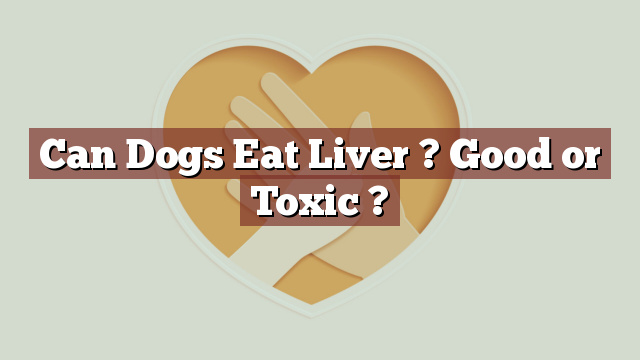Can Dogs Eat Liver? Good or Toxic?
It is important for pet owners to be aware of the foods that are safe for their furry friends to consume. Dogs have specific dietary needs, and certain foods that humans enjoy can be harmful or even toxic to them. One such food that often raises questions is liver. In this article, we will explore whether dogs can eat liver and whether it is good for them or toxic to their health.
Nutritional Value of Liver for Dogs: Essential Vitamins and Minerals
Liver is often considered a nutritious food for both humans and animals. It is rich in essential vitamins and minerals that are beneficial for overall health. For dogs, liver is a good source of vitamin A, vitamin B12, iron, and other important nutrients. These nutrients play a vital role in maintaining a healthy immune system, promoting cell growth, and supporting proper organ function.
Can Dogs Eat Liver? Exploring if it is Safe or Toxic for Your Pet
Can dogs eat liver? The answer is yes, dogs can eat liver. In fact, liver is often included in commercial dog foods and is generally safe for them to consume. However, it is important to note that moderation is key. While liver is packed with beneficial nutrients, excessive consumption can have negative effects on a dog’s health.
Potential Risks and Benefits of Feeding Liver to Your Dog
Feeding liver to your dog in moderation can provide numerous benefits. As mentioned earlier, liver is a rich source of vitamins and minerals that can support your dog’s overall health. However, it is important to be aware of potential risks associated with feeding liver to your pet. Liver is high in vitamin A, and excessive consumption of this vitamin can lead to vitamin A toxicity, which can cause bone problems, joint pain, and even affect a dog’s vision.
It is also worth noting that liver can be high in cholesterol, so if your dog has specific dietary concerns, such as pancreatitis or high cholesterol levels, consult with your veterinarian before including liver in their diet.
What to Do if Your Dog Eats Liver: Steps to Take and Monitoring
If your dog accidentally consumes a large amount of liver or if you suspect they are experiencing any negative effects after consuming it, it is important to take appropriate action. Monitor your dog closely for any signs of discomfort, such as vomiting, diarrhea, or lethargy. If you notice any concerning symptoms or your dog’s condition worsens, contact your veterinarian immediately.
Conclusion: Moderation and Veterinary Advice are Key
In conclusion, dogs can safely eat liver in moderation. It is a nutritious food that can provide essential vitamins and minerals. However, it is crucial to ensure that your dog’s overall diet is well-balanced and that liver is given in appropriate portions. Consulting with a veterinarian is always recommended, especially if your dog has specific dietary restrictions or health concerns. By taking these precautions, you can provide your furry friend with a balanced and healthy diet, ensuring their well-being and longevity.
Thank you for investing your time in exploring [page_title] on Can-Eat.org. Our goal is to provide readers like you with thorough and reliable information about various dietary topics. Each article, including [page_title], stems from diligent research and a passion for understanding the nuances of our food choices. We believe that knowledge is a vital step towards making informed and healthy decisions. However, while "[page_title]" sheds light on its specific topic, it's crucial to remember that everyone's body reacts differently to foods and dietary changes. What might be beneficial for one person could have different effects on another. Before you consider integrating suggestions or insights from "[page_title]" into your diet, it's always wise to consult with a nutritionist or healthcare professional. Their specialized knowledge ensures that you're making choices best suited to your individual health needs. As you navigate [page_title], be mindful of potential allergies, intolerances, or unique dietary requirements you may have. No singular article can capture the vast diversity of human health, and individualized guidance is invaluable. The content provided in [page_title] serves as a general guide. It is not, by any means, a substitute for personalized medical or nutritional advice. Your health should always be the top priority, and professional guidance is the best path forward. In your journey towards a balanced and nutritious lifestyle, we hope that [page_title] serves as a helpful stepping stone. Remember, informed decisions lead to healthier outcomes. Thank you for trusting Can-Eat.org. Continue exploring, learning, and prioritizing your health. Cheers to a well-informed and healthier future!

